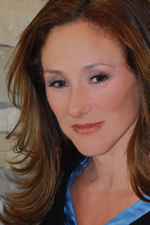By Allison Goldberg
Love = Happiness: And I am not taking about being in a relationship.
How often have you said something similar to this, ‘When I make more money, then, I will be happier’. ‘When I have a life partner, house and kids, then, I will be happier.’ ‘When I accomplish the career I really want, I will really be happy,’ or, ‘When I lose weight, I will finally be happy’.
Wouldn’t it be incredible to know that happiness is something that you can feel every day, several times a day, no matter what is going on in your life? Did I mention that being ‘in love with another person’ is not going to be the answer to your happiness? Happiness is a feeling and a decision that we make every day.
Here, is a very easy strategy that will give you the gift of happiness with one simple question that you ask yourself, all day every day.
Think of the word Favorite and what it means to you. What is your favorite song? What is your favorite pair of shoes? What is your favorite exercise? What is your favorite food? Then ask yourself, how much love and enjoyment comes from hearing your favorite song, wearing your favorite shoes, doing your favorite exercise and eating your favorite food? By definition, favorite is a word that demonstrates your strongest preference for something.
Let’s now move on to a new word that will become a big part of your daily vocabulary. That word is LOVE. This is the word and question that will change your life forever. Do I love (fill in blank here)? Begin to ask yourself this question as many times as you possibly can when going through your day. Each thing you choose for yourself, each moment, that is within your control, make sure that you LOVE it. (The key word here is control, because as we know, many things are out of our control.)
Let’s start with basic things that you do daily. What you wear each day. Do you love the thing you are putting on your body? Consider everything from your undergarments to your socks, shoes, pants, shirt, dress, jewellery or are you wearing it because it is there in your closet? If your answer is, I love this, wear it, if not, do not put it on your body, take it off. I challenge you to LOVE everything you wear.
Let’s go to a different example. Have you ever thought about your favorite exercise or sport? The question becomes then, why not do only a sport or exercise you love? There are enough choices out there for you to choose what you love and stick to it. Being healthy is important but you DO get to choose what you do to be healthy. If you love to run, by all means, run. Or if you prefer a sport, do the sport. But the key factor is this, LOVE what you choose. Love your choices, all day.
Let’s consider our friends. Of course, we have our obligatory friendships, and this mantra does not apply to those relationships. You know who I am talking about. However, you do have a choice on who you spend your time with. Make sure you love those people. Don’t agree to lunch or socialize with people you don’t really really want to be with. You can apply the LOVE =HAPPINESS to almost every area of your life that is WITHIN your control.
What happens when you apply this theory of ‘do i love this’? You will experience two very important things in your life that will forever change your path. You will experience feelings of love more than 50 times in a day. Feeling Love 50 times a day = HAPPINESS.
Try it out. See how much this activity will change your life. No matter what is going wrong in your day, today or any day, you are guaranteed to feel love and happiness throughout your day. No one and no circumstance can take away the luxury that you and only you have the choice to feel LOVE=HAPPINESS. You have added this amazing strategy to your life. Good luck. I feel love=happiness right now. I LOVED writing this article.

About the Author: Allison Goldberg
Allison’s Personal Story:
I was driving my car and listening to one of my many mentors through my blue tooth and when he was speaking, I had an epiphany.
I have been in the coaching industry for 17 years and when asked by both individuals and companies about myself, my logical brain went to the place of what I call “credential security” which was my college degree, many of the certification and training programs, my field experience and the many reputable companies and individuals that I have been fortunate enough to work with over the years. I have all of that data in a file ready to email to any person that wants to know.
Here is where my epiphany came in…. When I listen to my mentors, each of them has a real, raw story that defines them and that is what has fueled their passion and commitment to the field they are in. I too, have a story that gives me the passion and drive to help others live life to their full potential. It is a story that I have understood very clearly for my entire life, but sharing it, has not been something I would readily do.
I am now at the point where I think I have done myself and my clients a disservice by not sharing the story that has been the very thing that brought me to my passion. Which is the Life Coaching partnership with people who are looking for their reason, passion and goals for their own lives.
So, from this point on, when people ask me what is “my story”, this is what I will say.
I had a very traumatic entry into this word. I was born into a circumstance that is unusual and hard to hear for most people. I am the youngest of 3 children. 6 Months before I was born, my biological father went missing. Yes, missing, as in, he didn’t come home from work that day. He continued to be missing until 2 weeks before I was born. So, even as an unborn child, my mom was carrying a baby with a major mental burden of taking care of 2 other kids while being pregnant and the emotional agony of not knowing where her husband was. This time must have been extremely difficult and very taxing both physically and emotionally. Two weeks before I was born my biological father was found and he had been brutally murdered. Are you uncomfortable yet?
That was my start to coming into this world so as you can see that when a child is born, there welcome may be very different than mine. My start was rough. For the next few years of my life my mom was trying to deal with the death of her husband, being a widow and raising three children. You can imagine the priority that I felt as my place in this family. My mom would say that I was the very thing that kept her on her feet and getting out of bed each day because I was a baby who needed her. She actually thanks me for being responsible for her not going into the depths of depression. With that, my life would never be the same. Most other kids growing up have the typical challenges that come with being a child, a toddler ,a teenager and young adult. I feel like my trauma and ability to survive and succeed in life is very much due to the fact that I had to grow up very fast and live an “adult” life at such a young age.
I learned very quickly that doing it MYSELF and doing it with a PLAN was the only option that would help me feel safe and in control. I took on the roles to be like a mom, dad, teacher, housekeeper among many other things. But acting like a child or having a “fun, carefree childhood”…. I did not.
So, when people, be it friends or family or later on, clients would ask me why I seem to “have it all together”, it was not by choice, it was just my way of surviving my childhood. So by the time I was an adult, it came very naturally to me. Make a GOAL make a PLAN , DO IT , and if it doesn’t work, make another plan and keep going until you get your needs met as well as your goals accomplished.
That is how I was led into this field. So, in my opinion, my major in Communication, minor in sociology and my Life Coach certification course pales in comparison to the 46 years of living a goal driven life.
I would like to help you do the same.
And her professional one:
Allison Goldberg has been in human services since she graduated from the University of Texas with a Bachelor of Science in Communication in 1990 with a minor in Sociology. She graduated in 3 years because she wanted to get out into the work force and begin helping people.
Allison has spent the last 12 years focusing on her life coaching business venture, Personal Dynamics. Personal Dynamics is the name of her Life Coaching company and a spin off of her position as a corporate trainer and coach with Image Dynamics. Personal Dynamics life coaching is about creating an opportunity for Certified Life Coach, Allison to partner with her clients and develop a program and process to reach their personal goals. As a life coach, the idea is to bridge the gap between the clients personal goals and current daily life results. Life Coaching includes clarifying the client’s personal vision and purpose, addressing behaviors that create barriers to success, problem solving, and handling challenges as they occur.
You can find Allison at Personal Dynamics and on Facebook.



Allison Goldberg has been the life coach for my daughter for the last 5 years. Her life coaching experience with Allison has not only helped her to achieve goals, but more importantly, it has enabled her to discover who she is, what makes her tick, and what goals really are. She has the gift of being able to find the hidden treasures that allow her to achieve those goals. Her sessions with Allison are always productive. She is a great guide. Everything is done with honesty and grace. She’s always so supportive, encouraging and committed. She has allowed my daughter to soar! Allison is a treasure and a blessing in our lives.